erp system - who is it suitable for?
erp system - who is it suitable for and do we have to implement everything?
I will point out in advance that countless articles and books have been written on the subject of erp systems, and I do not intend to contradict these excellent contents. The purpose of this article is to define - is an erp system suitable for everyone and must everything be implemented? First, let's turn to the translation of the name:
The meaning of the term is: Enterprise Resource Planning - which translates as: organizational resource planning. The idea is a system, at the center of which is general resource planning according to all the information stored in it.
This information, which, as mentioned, is contained within the database, is entered by many users, each of whom sees the world through professional glasses focused on a specific field, and thus:
- The warehouse manager will see the world mostly according to: warehouses, products, packaging and locations, transports and picking waves
- The purchasing manager sees purchase requisitions, suppliers, delivery times, replacement products, import cases, price lists and more
- The marketing manager sees customers, agreements, customer orders, delivery times, production costs and sales price lists
- The production manager sees machines, product trees, raw materials, cycle times, loads, production plan and work orders
Everyone sees all the information they need for their work, even if this information belongs to another user.
If everyone enters the set of information they need, including information that, at times, they do not need directly, we can use the advanced features of the system for planning supplies, planning optimal production and reducing inventory to the minimum required.
Since this planning requires data from all organizational activity, a purchase order will be born from a purchase requisition, which originates from an erp run that analyzes inventory, supplier delivery times, marketing orders, product trees and more. This way we will get satisfied customers, since the orders will be on time without "stories", as well as loyal suppliers who will not be bothered because of a lack of planning.
Bottom line, we have an organization that operates according to a plan, not according to crises. By mistake it is customary to call erp - any system that combines several organizational areas under it, but as we have seen, the erp system allows the integration of multidimensional information for making organizational decisions and resource planning.
Let's return to the basic question from which we started - who is it suitable for?
Basically, for factories and production organizations. The source comes from the industry, but also from those who run an organization that is required to base reports and decisions on broad organizational information, and not necessarily required for multi-resource planning.
It is true to say that the advanced function of planning will not be reflected, but the benefits of using a single organizational system, which enables a uniform organizational language and the production of consequential information for decision-making from source data - are more important than optimal resource planning and can form a basic infrastructure for implementing planning in the future.
As evidence, many organizations that operate erp systems with great success - something that has completely changed the level of organizational information, but have not implemented the planning modules for various reasons.
At the end of the day, an erp system requires the organization to work with fixed methods and defined work practices, enforces processes, handcuffs users to use a reporting method and instills reporting credibility.
An organization can implement selected modules from the erp system and implement them correctly, as well as leave other modules for future implementation, or out of the system altogether. It is therefore possible to obtain many benefits from using an erp system, even if it is partially implemented.
Gradual implementation of an erp system allows building a developing infrastructure, which will accompany the organization throughout its growth. In conclusion, the organizational benefits of implementing an erp system are many, even if it is not fully implemented.
genie's information systems department invites you to consult with us on the establishment or construction of an erp system and its implementation in the organization. For questions and consultation, you can contact me directly by email: moshe@genie.co.il.
You may be interested in:

אירוע משפחות סוף קיץ 2025


פישינג בעסקים: איך לזהות, למנוע ולהגיב נכון


החשיבות של סריקות פגיעויות באבטחת סייבר






